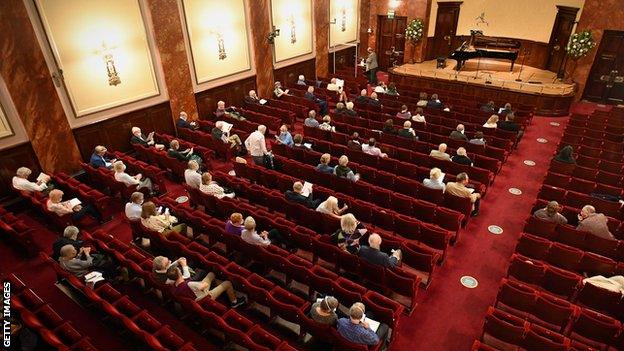Premier League chief Richard Masters makes case for fans' return to football
- Published

Wigmore Hall in London was the first major UK music venue to welcome back live audiences for a full autumn season
Premier League chief executive Richard Masters has used the example of a London Palladium event to make the case for fans returning to football.
Plans for limited numbers of supporters to return from 1 October were postponed amid a rise in coronavirus infections.
But pictures of an audience at a London Palladium show sparked questions about why crowds cannot return to sport.
"I know the government has some huge issues at the moment but the London Palladium was half-full," said Masters.
"We make the point that if that can be the case, we hope that football stadiums can reopen soon.
"We understand that DCMS [the Department for Culture, Media and Sport] has to do things for different sectors but ultimately there's an inconsistency there, that you can go to an indoor venue, enjoy an evening out.
"We think that's a really positive thing - the big question is why can't that be, in the near future, sports venues as well?"
Premier League clubs are losing about £100m a month with no fans allowed at games, while the English Football League says it stands to lose a further £200m if supporters do not return in 2020-21.
The lack of fans at football matches will be debated by MPs on 9 November after a petition to allow supporters to return received more than 196,000 signatures.
"The very clear advice was that at this stage of the disease, we should be imposing restrictions," Culture Secretary Oliver Dowden told a DCMS committee on Wednesday.
"We are doing things that are positively hateful, but the reason we are doing it is to secure public safety."
Professor Jonathan van Tam, the government's deputy chief medical officer, has said closed and crowded spaces may increase transmission of the virus.
Photographs of the show at the London Palladium, where former Arsenal manager Arsene Wenger was holding an event, showed audiences on Sunday and Monday wearing masks and separated by empty seats.
Allow X content?
This article contains content provided by X. We ask for your permission before anything is loaded, as they may be using cookies and other technologies. You may want to read X’s cookie policy, external and privacy policy, external before accepting. To view this content choose ‘accept and continue’.
Dowden said he "accepted people's frustrations at the inconsistency" of the rules between the two events.
"If we had social distancing for sport, that is a lot of people coming week in and week out going to sports stadiums up and down the country," Dowden said.
"There are actually very few socially distanced indoor performances going on. They are not massively financially viable.
"If people are unhappy with indoor performances going ahead with social distancing that is a separate question of whether you stop them."
The EFL said it was "deeply frustrated" at the continued delay to fans returning.
"While we recognise that the UK is facing a significant public health crisis, football and football supporters should be treated fairly," a statement to the Telegraph read., external
"From the league's position, it seems illogical that socially distanced events are taking place indoors at arts and music venues when football clubs have been prohibited from doing the same in outdoor stadiums.
"Football is one of the most heavily regulated areas of crowd management and we know from the successful staging of eight pilot events that clubs are able to introduce appropriate measures that will meet social distancing, rule of six and test and trace requirements."

Black History Month: Four must watch films
